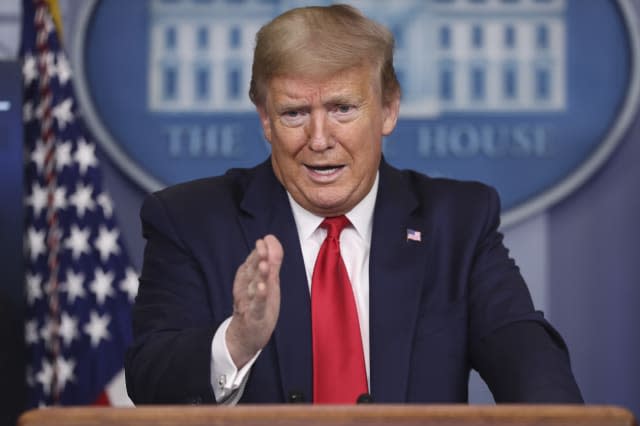Donald Trump pushes states to lift virus restrictions

US President Donald Trump has urged supporters to "LIBERATE" three states led by Democratic governors on Friday, apparently encouraging protests against stay-at-home restrictions.
This came as some states under Republican leadership edged toward easing up the mandates aimed at stopping the coronavirus.
A day after laying out a road map to gradually reopen the crippled economy, Mr Trump tweeted the kind of rhetoric some of his supporters have used to demand the lifting of the orders that have thrown millions of Americans out of work.
"LIBERATE MINNESOTA!" "LIBERATE MICHIGAN!" "LIBERATE VIRGINIA," he said in a tweet-storm in which he also lashed out at New York Gov. Andrew Cuomo for criticising the federal response to the pandemic.
Mr Cuomo "should spend more time 'doing' and less time 'complaining,'" the president said.
LIBERATE VIRGINIA, and save your great 2nd Amendment. It is under siege!
— Donald J. Trump (@realDonaldTrump) April 17, 2020
Responding to pleas from governors for help from Washington in ramping up testing for the virus, Mr Trump put the burden back on them: "The States have to step up their TESTING!"
He claimed "very partisan voices" had spread "false and misleading information" about the nation's testing capacity, but said "we'll help New York and all of the other states get even better on their testing".
At the same time, at least two states took their first steps toward easing the restrictions.
In Florida, Republican governor Ron DeSantis said municipalities could reopen beaches and parks if they could do so safely. In Texas, Republican governor Greg Abbott said stores could begin selling curbside, non-essential surgery could resume and state parks could reopen.
Mr Trump has repeatedly expressed his desire to see businesses reopen quickly and claimed earlier this week he had total authority over the matter, even though the lockdowns and other social-distancing measures have been imposed by state and local leaders, not Washington.
"We may be opening but we're putting safety first," Mr Trump said.

On Thursday, he outlined a three-step set of guidelines for easing restrictions over a span of several weeks in places that have robust testing and are reporting decreases in Covid-19 cases, assuring the nation's governors: "You're going to call your own shots."
But governors from both parties suggested on Friday they would be cautious in returning to normal, with some warning they could not do it without help from Washington to expand testing.
West Virginia governor Jim Justice, a Republican ally of Mr Trump, said he would listen to medical experts in deciding how to move forward.
"I am not going to do something that I feel in my heart is the wrong thing that's going to endanger our people," he said.
Washington's Democrat governor Jay Inslee said Mr Trump's tweets about "liberating" states put millions of Americans at risk of contracting Covid-19.
"His unhinged rantings and calls for people to 'liberate' states could also lead to violence," Mr Inslee said.
"We've seen it before. The president is fomenting domestic rebellion and spreading lies even while his own administration says the virus is real and is deadly."
Democratic Virginia governor Ralph Northam said he and his staff were focused not on the president's tweets but on fighting a "biological war".
"I do not have time to involve myself in Twitter wars," said Mr Northam, who is a medical doctor.
"I will continue to make sure that I do everything that I can to keep Virginians safe and to save lives."
The clash between Mr Trump and Mr Cuomo was personal, with the president complaining the governor had not said "thank you" for help received from Washington.
Mr Cuomo countered by saying: "I don't know what I'm supposed to do, send a bouquet of flowers? 'Thank you to the federal government for participating in a federal emergency'."
Governor Cuomo should spend more time "doing" and less time "complaining". Get out there and get the job done. Stop talking! We built you thousands of hospital beds that you didn't need or use, gave large numbers of Ventilators that you should have had, and helped you with....
— Donald J. Trump (@realDonaldTrump) April 17, 2020
Even in largely rural states with small populations, such as Wyoming, Maine and South Dakota, governors said they were not anxious to quickly resume business as usual.
However, the University of Washington, whose computer models have frequently been cited by health officials at White House briefings, on Friday predicted Vermont, West Virginia, Montana and Hawaii could open as early as May 4 if they restrict large gatherings, test widely and quarantine the contacts of people who test positive.
Iowa, North and South Dakota, Nebraska, Utah, Arkansas and Oklahoma, however, are among states that would need to wait until mid-June or early July, the institute said.
The official death toll in the US is nearing 35,000, with some 685,000 confirmed infections. Some 22 million people have lost their jobs.
Many Americans, especially in rural areas and other parts of the country that have not seen major outbreaks, have urged governors to reopen their economies. Protesters have taken to the streets in Ohio, Texas, North Carolina, Kentucky, Virginia and Michigan, where more than 3,000 turned out on Wednesday in what looked like one of the president's rallies, with Make America Great Again hats and Trump flags.


